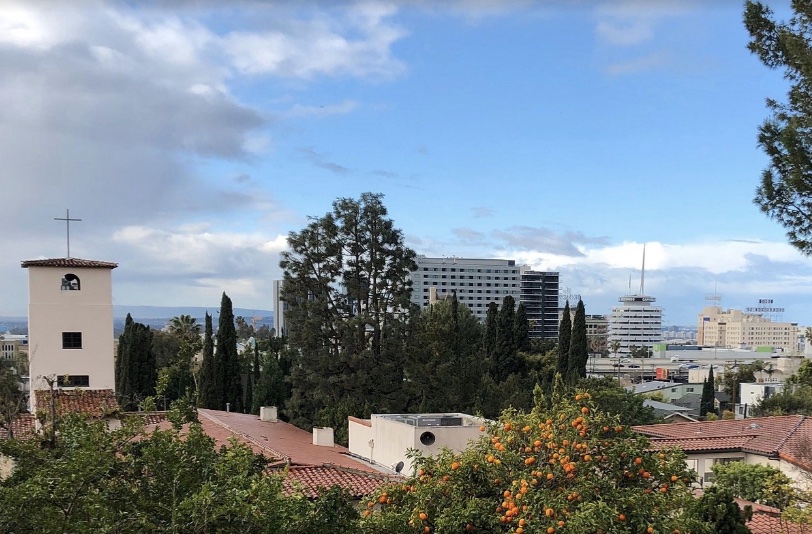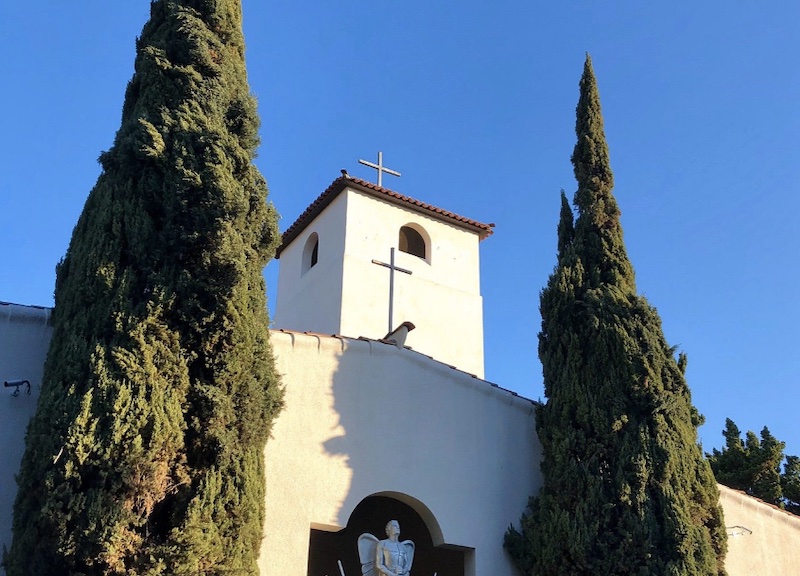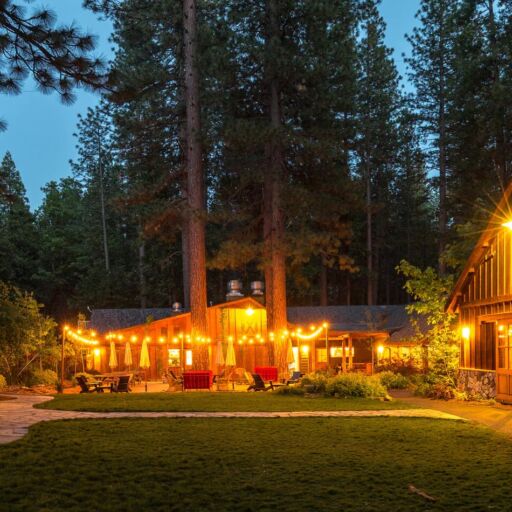I showed up to the trendy Franklin Village neighborhood of Hollywood frizzy-haired and in a sweat-soaked T-shirt, typical of my long drives from San Diego sans air conditioner. Just blocks from the star-filled, urine-smelling sidewalks of Hollywood Boulevard, where I had just seen heroin junkies shooting up, several buxom celebrity impersonators sidling up to tourists and two police helicopters overhead, my residence for the evening was a singing anomaly.
The compound sat behind a tall, iron gate, which clanged loudly as it shut me inside an alternate world. Here, the strongest smells came from a bed of roses surrounding a Mary statue and wafting pumpkin bread. I crossed the lawn lined with manicured hedges and pink zinnias to a stucco building containing a gift shop as I had been directed to do over email. No one was inside. There was no credit card put on file, no copy made of my license. On the counter, beside the handmade rosaries and prayer cards, lay an envelope with my name scrawled on it, a room number and an apology that no one could greet me in person: everyone was at Mass.
Outside the gift shop, the enormous “H” of the Hollywood sign loomed large on the chaparral-covered foothills of Griffith Park; the frequently Instagrammed Brush Canyon Trail that leads to the sign was just a stone’s throw away. A wordless landscaper in the garden pointed me to my room, one of four in this strip of building. My residence had a living room, a bedroom, a bathroom, a window box air conditioner and a kitchenette, all meticulously clean and decorated with just one crucifix and a Mother Theresa poster. I sat on the springy bed covered with a handknit coral blanket; tears of gratitude sprung to my eyes.
Fresh out of film school, I was making the slow pilgrimage from San Diego to Los Angeles, one that involved working unpaid on film sets and soulless editing or writing gigs to save up money to move to L.A. I had recently broken ties with a producer who had a penchant for misogyny and routine emotional abuse and found myself needing cheap — preferably free — places to stay. While film school friends of mine had found success couch-surfing or staying at hostels, my temporary lodging would come from what I thought was the naive suggestion of my boyfriend’s Irish mother: “You could always stay in a monastery.”

A cursory Google search brought me to a century-old cloistered monastery — Monastery of the Angels — nestled in the foothills under the Hollywood sign. At this incongruous location, these Dominican Sisters make lifelong vows to obedience, chastity and poverty, living in prayer behind the campus’ gates save for funerals and retreats. They survived off of donations and the profits made by selling their famously delicious pumpkin bread and peanut brittle. This particular order has dedicated themselves to praying 24 hours a day for their surrounding neighbors and to fulfilling the prayer requests that pour in through their website. Guests can join them in their chapel to pray from behind a screen.
I had wounds from my Catholic faith, and the thought of even night in a monastery sent a ripple of anxiety through me, but my desperation was more persuasive. I sent a tentative email to the monastery’s prioress, Sr. Mary St. Pius O.P., riddled with disclaimers: “I’m not sure if this is even a thing…but I’ve heard that…” Several hours later I received a brief response. “You are welcome to come; just tell me what time to expect you.” I had been told that donations were traditionally appreciated when staying at a monastery, but Sr. Mary never mentioned anything about it.
During my three-night stay, I returned from work to the sound of the nun’s velvety voices. Sometimes, the sound drew me into the austere chapel where the sisters sat at an altar behind a grate singing their evening prayers. The Latin chant echoed out of the windows into a city that was just awakening to the rabble-rousing of an evening, but I, for one, was glad to be there, in the nun’s little oasis, absorbing their placidity.

Growing up Catholic, I was accustomed to stories of benevolent saints and their generosity, religious communities dedicated to the poor and downtrodden. But life, and certainly L.A., had taught me the wariness of the city, the calculation of relationships and the supremacy of the dollar. These sisters seemed to operate in a separate economy.
This economy of the sisters, I would come to learn, was not unique but an integral part of Catholic communal religious life everywhere. While the philosophy of “welcoming the stranger” certainly has roots in Scripture, many historians date this tradition back to the sheltering of early Christians fleeing persecution in the early hundreds of the Common Era or the sheltering of pilgrims who were traveling to holy sites or tombs of martyrs and saints. Most orders, however, trace their inspiration to “The Rule of St. Benedict”: the writings of a fifth-century Catholic saint, Benedict of Nursia, who created detailed guidelines for religious communities. Since, welcoming guests into the monasteries and convents has become common practice throughout the world.
While the Benedictines, the order founded by St. Benedict, place particularly high value on hospitality, most orders have adopted the practice of reserving quarters or rooms where visitors (planned or not) are welcome to stay. Each varies in their offerings and requested donations, but there is a general uniformity. For hundreds of convents and monasteries in North America, and thousands worldwide, the practice stands: If you need a place to stay — they will let you stay.
That first stay at the Monastery of the Angels opened my eyes to an entirely new form of lodging. The monastery became my go-to accommodation as I worked on moving to L.A., and, once I lived in L.A., it was where I sent groups of my visitors to stay. From then on, whenever I was traveling, in addition to perusing Airbnb and Hipcamp offerings, I’d do my Google search: (city) Catholic nuns/brothers. When I visited a friend in Illinois, I stayed in a bucolic countryside convent with an order of French brothers and sisters where I had an apartment to myself and was invited to join the sisters for meals. In D.C., I stayed in the basement of an urban religious order’s home just blocks from Dupont Circle. When I had an internship in Kansas City, Mo., I lived for several months with a community of sisters in one of their spare bedrooms. When my husband, daughter and I were road-tripping in California and our campsite fell through, we stopped at the New Camaldoli Benedictine Hermitage in Big Sur.
I have since created a bucket list of the communities I hope to stay with someday: the Shrine of St. Therese retreat center in the Chilkat mountains on the Alaskan harbor, the Lithuanian Friars guest house in Kennebunkport, Maine, the Benedictines of Abuquiu adobe-style flats under the desert stars in Carson National Forest. Pore through the more updated websites of some religious orders and you’re bound to stumble upon guidelines for those who wish to stay there. Other orders, and those without websites, may not publicize such information, but it can easily be found by contacting the abbot, prior or prioress of any order.
If the motivation for the hospitality of these orders today is subversive conversion, it isn’t heavy-handed. In every community I’ve stayed, I’ve felt welcomed and accepted, but never preached at. The sisters and brothers seemed far more preoccupied with their other duties — farming, teaching, charitable work, prayer, etc. — than my personal beliefs. Each order describes their hope for those who come to stay in different ways. The Camaldolese monks hope visitors experience a “dynamic and creative peace,” the Lithuanian friars hope to offer guests a “spiritual and physical renewal” and the desert Benedictines’ describe it as their “special privilege to have all people of whatever faith or belief, ethnic or cultural background to come and find a place of silence, solitude and peace.”
Sheltered from the frenzy of the city in a space stubbornly frozen in time, the monastery’s sturdy silence soothed like a balm. In the nun’s dingy chapel, I listened to their voices rise to the rafters, as they drowned out the sounds of the police helicopters, the student loans, the imposter syndrome of those early post-grad years. All I could hear was “and all shall be well, and all manner of things shall be well.”




